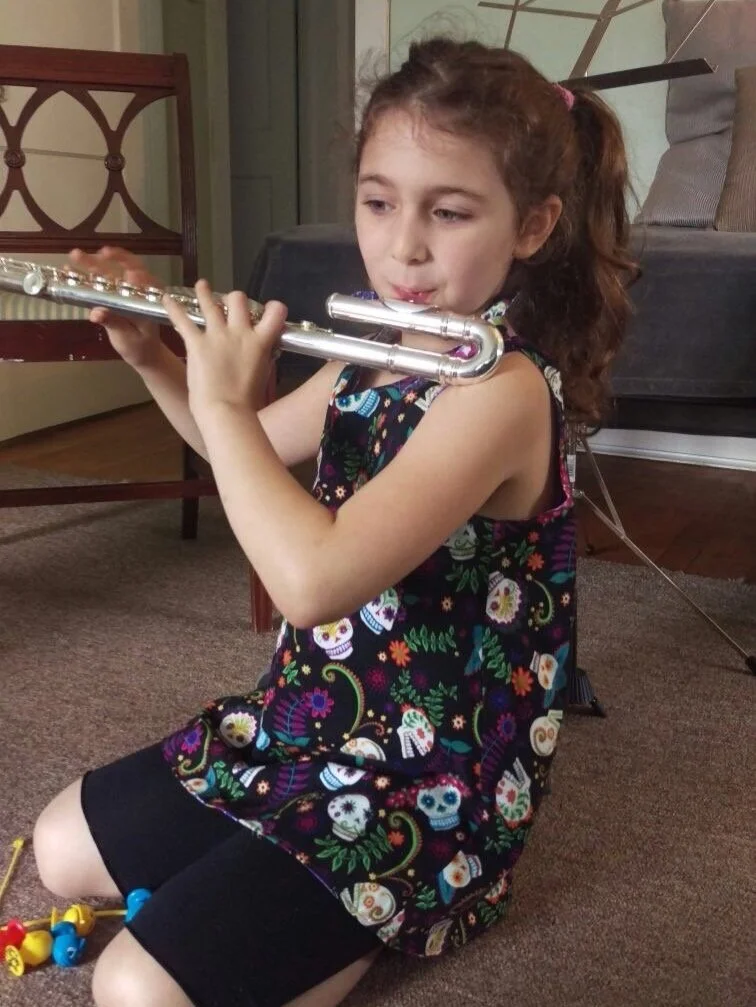The Complete Guide to Music Practice
Why is practice important?
Practice directly relates to progress! The more time you put in, the faster your progress on the instrument will be. Without practice, your child will be stuck learning the same thing over and over again during their lessons. Things will feel hard and they will be frustrated and bored. Playing an instrument is difficult enough, so we want to set children up for success!
And of course you have made the investment in an expensive instrument and lessons, so it’s important to get the most out of the experience!
Take charge!
This might come as a surprise, but at least for younger children, it is 100% the parent’s responsibility to make sure that the music practice happens. Even if your child loves their teacher and loves music and loves their lessons, they are most likely not going to have the thought “Oh I haven’t played my flute today, I should do that before playing with my toys.” Expecting that kind of mature discipline at a young age is just going to set you up for failure.
Of course we want them to eventually get to a point where they practice on their own! With years of music study, your child will without a doubt develop self-discipline, a strong work ethic, time management skills, and hopefully a genuine love of music! But in the beginning, they will need your guidance.
An important step in establishing great practice habits at home is to have realistic expectations that are developmentally & age appropriate and to adjust your own mindset with the understanding that you are in charge of your child’s education.
How do I get my child to practice?
You can minimize nagging and set your child up for success by following these tips!
Invite them in:
Give the child a heads-up that practice time is coming & allow for adequate transition time
Try putting on some flute music to signal practice time rather than verbal cues
Leave the instrument out of the case so that it’s easily accessible
Set up a hands-on music game to ease into practice
Set a routine:
Design a cozy practice corner that’s dedicated just for music
Set an alarm for practice at the same time everyday
Have a plan:
Create a practice list with your teacher
Check items off the list or use stickers
Make it fun!
Make a paper fortune teller with practice items inside
Build a musical board game with songs, scales, and exercises. Use a dice & game pieces to play around the board!
Have a pretend recital and set up an audience with all of your stuffed animals & dolls
Incorporate your child’s interests into music practice
Don’t even call it practice, call it play! “Flute play” is more appealing that “flute practice.”
How much should we practice?
The wonderful thing about taking private lessons, is that each student and family can set their own pace. Realizing this really helps to take the pressure off! Some families make flute a major priority and are able to practice every day (or most days). It’s a set part of their routine so they reap all of the benefits! While this is definitely the ideal situation, it might not be realistic for every family and that is OK!
It is also important to realize that it takes a while to work up to a consistent practice routine. If you just started taking lessons, you have to give yourself and your child some time to settle in and find a practice flow that works for you.
If you are looking for a little more guidance on exactly how long to practice each day, check out this sample practice plan for each age group:
AGES 3-5:
5 minutes of focus time working on a particular skill
10-15 min of musical play time (music activity, movement, listening, dance, etc.)
10 min of parent practice time (allows child to learn through immersion)
AGES 6-9:
10-20 min of focus practice time
10-15 min of music activities, movement, or listening on alternative days or weekends
AGES 10-12:
20-30 min of focus practice time
AGES 13+:
30 min-1 hour of focused practice time
Understand the Honeymoon Phase!
Of course the best case scenario is that your child loves the flute so much that they are intrinsically motivated to play everyday without even being asked! In fact, you might find that this is the case when you first start taking lessons. The flute is this shiny new toy and they simply can’t put it down! But as the weeks or months go by, you might find that the novelty of it starts to wear off. Lessons start to get more challenging and the child realizes that this is going to take hard work and effort! It might appear that they are loosing interest in the flute, but really it’s just the end of the honeymoon phase!
So what do you do?
Realize that just because the novelty has worn off, does not mean that your child no longer likes music.
Remember why you decided to start music lessons and hold the expectation that it is an important part of their education.
Understand that progress is not a straight line and there will be ups & downs and high & lows, and it’s all part of the process!
Follow the tips above in order to make practice consistent, fun, and meaningful for the child.
And remember, you don't have to do this all on your own! Your teacher is there to support you and will help you to navigate practice through your child’s musical journey.






